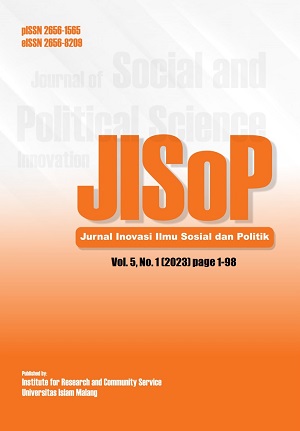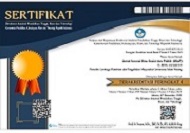Institutional strengthening in village ecotourism development
DOI:
https://doi.org/10.33474/jisop.v5i1.19798Keywords:
institutional capacity, village, ecotourismAbstract
This study aims to explore village institutions in managing the tangkas lake ecotourism in Muaro Jambi Regency, Jambi Province. This research is based on ecotourism, which is being studied by many researchers as responsible tourism towards socio-economic and environmental sustainability. In addition, institutions in ecotourism management that should be oriented towards the people's economy are often confronted with the interests of a few people. Therefore, based on the objectives of this study, a qualitative method was used with a descriptive exploratory approach to obtain an overview of the findings to answer the research questions. While the primary research data obtained through observation, interviews, and documentation. Then the secondary data will go through a review of documents, literature, social media, or others according to the research objectives. The results of the study show that leadership and coordination have been developed quite well, which were initiated directly by the village government. Partnerships that are built in complementary synergies so that they become the basis for developing potential based on academic knowledge. Meanwhile, Lake Tangkas ecotourism promotion facilities have utilized social media with websites and Facebook to Instagram. However, the village government is too structurally involved with policy makers ranging from the village head to the village secretary, while the strategic position of the community can be more dominant. The university carries out dharma service but does not significantly influence the development and contribution of the tangkas lake ecotourism management institution.
References
Amanchukwu, R. N., Stanley, G. J., & Ololube, N. P. (2015). A Review of Leadership Theories, Principles and Styles and Their Relevance to Educational Management. Management, 5(1), 6–14. https://doi.org/10.5923/j.mm.20150501.02
Arikunto, S. (2011). Prosedur penelitian : suatu pendekatan praktik (Ed. Rev. V). Rineka Cipta.
Castañer, X., & Oliveira, N. (2020). Collaboration, Coordination, and Cooperation Among Organizations: Establishing the Distinctive Meanings of These Terms Through a Systematic Literature Review. Journal of Management, 46(6), 965–1001. https://doi.org/10.1177/0149206320901565
Cox, K., Jolly, S., Van Der Staaij, S., & Van Stolk, C. (2018). Understanding the drivers of organisational capacity. RAND.
Damanik, J., & Weber, H. F. (2006). Perencanaan Ekowisata: Dari Teori ke Aplikasi (S. Suyantoro (ed.)). Pusat Studi Pariwisata (PUSPAR) UGM.
Danau Tangkas. (2023). Danau Tangkas.
Decorby-Watson, K., Mensah, G., Bergeron, K., Abdi, S., Rempel, B., & Manson, H. (2018). Effectiveness of capacity building interventions relevant to public health practice: A systematic review. BMC Public Health, 18(1), 1–15. https://doi.org/10.1186/s12889-018-5591-6
Denhardt, R. B., Denhardt, J. V, Aristigueta, M. P., & Rawlings, K. C. (2018). Managing human behavior in public and nonprofit organizations. Cq Press.
Firdaus, & Santoso, M. A. (2022). Dampak Pengembangan Wisata Danau Tangkas Terhadap Ekonomi Masyarakat Lokal. Humantech : Jurnal Ilmiah Multidisiplin Indonesia, 2(2), 188–199. https://doi.org/10.32670/ht.v2i2.1205
Gillier, T., Osman Kazakci, A., & Piat, G. (2012). The generation of common purpose in innovation partnerships: A design perspective. European Journal of Innovation Management, 15(3), 372–392. https://doi.org/10.1108/14601061211243684
Hermawan, H. (2016). Dampak Pengembangan Desa Wisata Nglanggeran Terhadap Ekonomi Masyarakat Lokal. Jurnal Pariwisata, 3(2), 105–117. https://doi.org/10.31294/par.v3i2.1383
Iznillah, M. L., & Basri, Y. M. (2018). Analysis of transparency and accountability of village fund management in Bengkalis Sub-district. Journal of Economics, Business, and Government Challenges, 1(2), 135–142. https://doi.org/10.33005/joebgc.v1i02.341
Jabeen, N., & Iqbal, M. Z. (2020). Gender and Local Governance in Pakistan: Promoting Participation through Capacity Building. South Asian Studies, 25(2), 255–281. http://journals.pu.edu.pk/journals/index.php/IJSAS/article/view/2798
Jami, Y., & Gökdeniz, I. (2020). The Role of Universities in the Development of Entrepreneurship. Przedsiębiorczość - Edukacja, 16(1), 85–94. https://doi.org/10.24917/20833296.161.7
Jordan, P. J., & Troth, A. C. (2020). Common method bias in applied settings: The dilemma of researching in organizations. Australian Journal of Management, 45(1), 3–14. https://doi.org/10.1177/0312896219871976
Khan, M., Mfitumukiza, D., & Huq, S. (2020). Capacity building for implementation of nationally determined contributions under the Paris Agreement. Climate Policy, 20(4), 499–510. https://doi.org/10.1080/14693062.2019.1675577
Kivle, B. T. (2020). Work on values when shaping public institutions: “What’s trust got to do with it?"-Experiences from scandinavia. In Understanding Values Work: Institutional Perspectives in Organizations and Leadership (pp. 223–243). https://doi.org/10.1007/978-3-030-37748-9_12
Krishnaveni, R., & Sujatha, R. (2013). Institutional Capacity Building: A Systematic Approach. SCMS Journal Of Indiean Management, 10(4), 17–25.
Kurniawan, W. (2015). Dampak Sosial Ekonomi Pembangunan PariwisataUmbul Sidomukti Kecamatan Bandungan Kabupaten Semarang (Socio-Economic Impact of Development of Umbul Sidomukti Tourism in Bandungan District, Semarang Regency). Economic Development Analysis Journal, 4(4), 444–451. https://doi.org/10.15294/edaj.v4i4.14851
Kusuma, D. W. (2020). Institutional Capacity Development Of Rural Tourism In Lombok Kulon Bondowoso. International Journal of Environmental, Sustainability, and Social Science, 1(1), 47–53. https://doi.org/10.38142/ijesss.v1i1.44
Liu, C., Dou, X., Li, J., & Cai, L. A. (2020). Analyzing government role in rural tourism development: An empirical investigation from China. Journal of Rural Studies, 79, 177–188. https://doi.org/https://doi.org/10.1016/j.jrurstud.2020.08.046
Manggu, B., & Beni, S. (2020). The Impact Of Village-Owned Enterprises (Bumdes) In Strengthening Local Economy In The Border Village Of Sebente, Bengkayang Regency. Primanomics : Jurnal Ekonomi & Bisnis, 18(3 SE-Articles), 24–35. https://doi.org/10.31253/pe.v18i3.389
Menparekraf: (2022). Siaran Pers: Menparekraf: Wisman ke Indonesia pada Desember 2022 Naik 447,08 Persen. Https://Www.Kemenparekraf.Go.Id.
Nugroho, I., Negara, P. D., & Yuniar, H. R. (2018). the Planning and the Development of the Ecotourism and Tourism Village in Indonesia: a Policy Review. Journal of Socioeconomics and Development, 1(1), 43–51. https://doi.org/10.31328/jsed.v1i1.532
Nuraini, Satria, A., Wahyuni, E. S., & Bengen, D. G. (2021). Strengthening marine ecotourism management’s institutional performance in Raja Ampat, Indonesia. Pertanika Journal of Social Sciences and Humanities, 29(3), 1809–1829. https://doi.org/10.47836/pjssh.29.3.18
Ostrom, E. (2010). Institutional Analysis and Development: Elements of the framework in historical perspective. Historical Developments and Theoretical Approaches in Sociology, II, 261–288.
Ostrom, E. (2019). Institutional rational choice: An assessment of the institutional analysis and development framework. In Theories of the policy process (pp. 21–64). Routledge.
Ostrom, E. (2020). Beyond markets and states: polycentric governance of complex economic systems. In Shaping Entrepreneurship Research (pp. 353–392). Routledge.
Parmadi, Haryadi, Junaidi, Hodijah, S., Hastuti, D., & Heriberta. (2022). Pemberdayaan Penguatan Kelembagaan dalam Pengembangan Wisata Danau Tangkas Desa Tanjung Lanjut Kecamatan Sakernan Muaro Jambi. Studium: Jurnal Pengabdian Kepada Masyarakat, 2(1), 29–36. https://doi.org/10.53867/jpm.v2i1.43
Peters, B. G. (2019). Institutional theory in political science: The new institutionalism (Fourth). Edward Elgar Publishing.
Prafitri, G. R., & Damayanti, M. (2016). Kapasitas Kelembagaan Dalam Pengembangan Desa Wisata (Studi Kasus: Desa Wisata Ketenger, Banyumas). Jurnal Pengembangan Kota, 4(1), 76. https://doi.org/10.14710/jpk.4.1.76-86
Purnamawati, I. G. A., Jie, F., & Hatane, S. E. (2022). Cultural Change Shapes the Sustainable Development of Religious Ecotourism Villages in Bali, Indonesia. Sustainability (Switzerland), 14(12), 1–15. https://doi.org/10.3390/su14127368
Putra, F., Usman, S., & Yusuf, M. (2019). Pemberdayaan pengelolaan desa wisata berkelanjutan di Desa Tanjung Lanjut Kecamatan Sekernan Kabupaten Muaro Jambi. Unri Conference Series: Community Engagement, 1, 83–88. https://doi.org/10.31258/unricsce.1.83-88
Renz, S. M., Carrington, J. M., & Badger, T. A. (2018). Two strategies for qualitative content analysis: An intramethod approach to triangulation. Qualitative Health Research, 28(5), 824–831. https://doi.org/10.1177/1049732317753586
Selznick, P. (2011). Leadership in administration: A sociological interpretation. Quid Pro Books.
Sentanu, I. G. E. P. S., Prabowo, A., Kumalasari, K., Galih, A. P., & Wismanu, R. E. (2021). Stakeholder Collaboration Model for Ecotourism Development: A Case Study from Batu City, East Java Province. Journal of Government and Civil Society, 5(10), 214–236. https://doi.org/10.31000/jgcs.v5i2.4420
Sesotyaningtyas, M., & Manaf, A. (2015). Analysis of Sustainable Tourism Village Development at Kutoharjo Village, Kendal Regency of Central Java. Procedia - Social and Behavioral Sciences, 184, 273–280. https://doi.org/https://doi.org/10.1016/j.sbspro.2015.05.091
Sholihah, M., & Saadatirrohmi, S. A. (2022). Role of Village Government in the Development of Tourism Villages in Tempos Village, Gerung District, West Lombok Regency. Jurnal Pariwisata Nusantara (JUWITA), 1(3), 256–263. https://doi.org/10.20414/juwita.v1i3.6264
Singgalen, Y. A., Sasongko, G., & Wiloso, P. G. (2019). Efforts to Achieve Environmental Sustainability through Ecotourism. Journal of Indonesian Tourism and Development Studies, 7(2), 111–119. https://doi.org/10.21776/ub.jitode.2019.07.02.07
Spithoven, A. (2019). Similarities and Dissimilarities between Original Institutional Economics and New Institutional Economics. Journal of Economic Issues, 53(2), 440–447. https://doi.org/10.1080/00213624.2019.1594532
Sugiono. (2015). Metode Penelitian kuantitatif, kualitatif dan R&D. Alfabeta.
Utami, M. M., Taufik, H. E. R., & Bhakti, W. N. (2019). Village Tourism: The Implementation of Community-Based Tourism. 2019 International Conference on Organizational Innovation (ICOI 2019), 537–542.
Xu, L., Ao, C., Liu, B., & Cai, Z. (2022). Ecotourism and sustainable development: a scientometric review of global research trends. Environment, Development and Sustainability, 25(4), 2977–3003. https://doi.org/10.1007/s10668-022-02190-0
Zulgani, Zevaya, F., Umiyati, E., Hastuti, D., & Nurjanah, R. (2022). Pemberdayaan Desa Wisata Berbasis Integrasi Budaya dan Potensi Alam di Desa Tanjung Lanjut Muaro Jambi. Studium: Jurnal Pengabdian Kepada Masyarakat, 2(1), 1–6. https://doi.org/10.53867/jpm.v2i1.44
Downloads
Published
How to Cite
Issue
Section
License
Copyright (c) 2023 Suhendri, Dida Helena , Pahrudin

This work is licensed under a Creative Commons Attribution-ShareAlike 4.0 International License.
.



_-_Copy.jpg)





